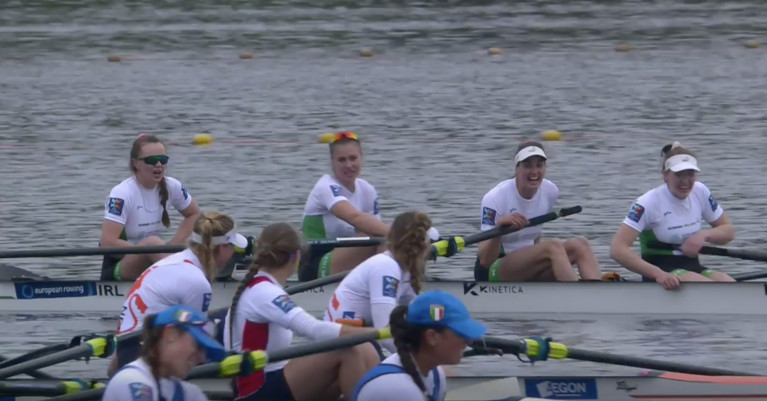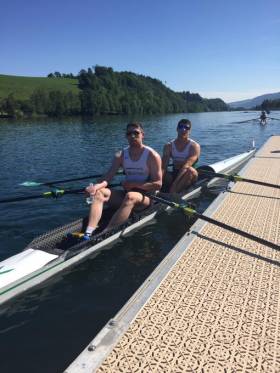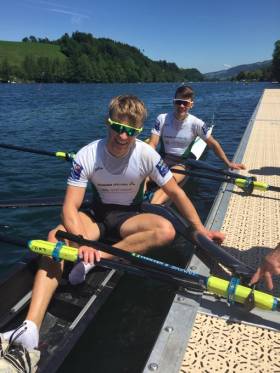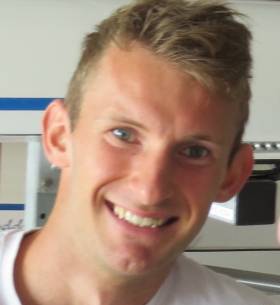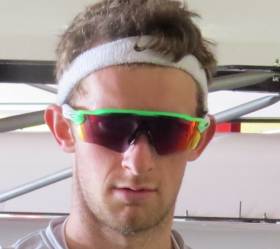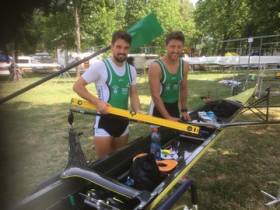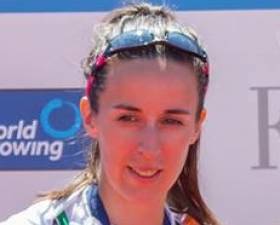Displaying items by tag: European Rowing
Ireland Women's Four Take European Silver
The Ireland women’s four took a wonderful silver medal at the European Rowing Championships in Varese, Italy, today.
The crew of Aifric Keogh, Eimear Lambe, Fiona Murtagh and Emily Hegarty raced so well that they pushed up very close to the Netherlands in a push for gold.
The new Irish combination started slowly, but slotted into the leading trio of the Dutch, British and Irish. In the third quarter the Ireland four pushed through Britain and then tested the Dutch coming to the line.
Britain, with Rebecca Shorten of Northern Ireland in the stroke seat, took bronze.
Earlier, the women’s pair of Aileen Crowley and Monika Dukarska showed well in the early stages of their A Final, but in a hot race they were pushed back to sixth at the finish. Britain’s Helen Glover and Polly Swann justified their favouritism to race to gold – but they were given a battle by Romania, while Spain took the bronze.
Gary O’Donovan had to settle for fourth in his A Final of the lightweight single sculls. The race belonged to Peter Galambos of Hungary: he led through all four quarters. O’Donovan made ground in the closing stages, but was 4.3 seconds off Galambos at the finish.
Lydia Heaphy got off to a great start in the lightweight women’s single and led early on. However, Alena Furman of Belarus moved swiftly into the lead and stretched it down much of the course to win gold. Heaphy finished sixth.
Enniskillen woman Holly Nixon teamed up in the Britain double with Saskia Budgett to take a bronze medal in a race won by Romania.
European Rowing Championships, Varese, Italy, Day Three (Irish interest)
Men
Double Sculls – B Final (Places 7 to 12): 1 Ireland (R Byrne, P Doyle) 6:21.47, 2 Italy 6:22.52, 3 Germany 6:23.29.
Single Sculls – C Final (Places 13 to 18): 1 Russia 7:08.08, 2 Ireland (D Lynch) 7:09.01.
Lightweight Single Sculls – A Final: 1 Hungary (P Galambos) 7:01.52; 4 Ireland (G O’Donovan) 7:05.82.
Women
Four – A Final: 1 Netherlands 6:27.51, 2 Ireland (A Keogh, E Lambe, F Murtagh, E Hegarty) 6:27.96, 3 Britain (4 R Shorten) 6:31.27.
Pair – A Final: 1 Britain 7:02.73; 6 Ireland (A Crowley, M Dukarska) 7:11.83.
Double Sculls – A Final: 3 Britain (1 H Nixon) 6:55.13.
Lightweight Single Sculls – A Final: 1 Belarus (A Furman) 7:41.81; 6 Ireland (L Heaphy) 7:58.70.
Italy Catch Doyle and Byrne on Line at European Rowing
#Rowing: Ireland’s Philip Doyle and Ronan Byrne finished fourth in their B Final, tenth overall, at the European Rowing Championships in Lucerne this morning. In a good race with an exciting finish, Germany led off as if they intended to dominate. Ireland headed a pack of three who were closest to them. Lithuania were fastest through the last 700 metres and almost caught Germany on the line, while Ireland were pushed out of third by Italy by 17 hundredths of a second.
Lydia Heaphy and Denise Walsh took sixth in their B Final, 12th overall. The Netherlands were impressive winners.
European Championships, Lucerne, Day Three (Irish interest)
Men
Double Sculls – B Final (Places 7 to 12): 1 Germany 6:19.30, 2 Lithuania 6:19.44, 3 Italy 6:22.64, 4 Ireland (P Doyle, R Byrne) 6:22.81
Women
Lightweight Double Sculls – B Final (Places 7 to 12): 1 Netherlands 7:05.12; 6 Ireland (D Walsh, L Heaphy) 7:22.38.
Puspure Qualifies for European Rowing Final
#Rowing: Ireland has qualified two boats for the A Finals of the European Rowing Championships in Lucerne, Switzerland. Sanita Puspure qualified for the A Final of the single sculls, taking second in her semi-final behind the Olympic champion of 2012, Mirka Topinkova Knapkova.
Earlier, Skibbereen twins Fintan and Jake McCarthy took third in their semi-final of the lightweight double sculls.
The first semi-final of the women’s single saw Jeannine Gmelin of Switzerland fashion a good win.
European Championships, Lucerne, Day Two (Irish interest)
Men
Double Sculls – Semi-Final One (First Three to A Final; rest to B Final): 1 Netherlands 6:11.71, 2 Britain 6:12.61, 3 France 6:13.81; 4 Ireland (P Doyle, R Byrne) 6:14.37.
Lightweight Double Sculls – Semi-Final One (First Three to A Final; rest to B Final): 1 Germany 6:16.29, 2 Spain 6:17.83, 3 Ireland (F McCarthy, J McCarthy) 6:17.97; 4 Czech Republic 6:18.78.
Lightweight Single Sculls – C Final (Places 13 to 17): 1 Austria (R Kepplinger) 7:09.42; 4 Ireland (G O’Donovan) 7:18.11.
Women
Lightweight Double Sculls – Semi-Final Two (First Three to A Final; rest to B Final): 1 Switzerland 6:55.47, 2 Italy 6:55.92, 3 Romania 6:56.25; 6 Ireland (D Walsh, L Heaphy) 7:18.75.
Single Sculls – Semi-Final Two (First Three to A Final; rest to B Final): 1 Czech Republic (M Topinkova Knapkova) 7:32.69, 2 Ireland (S Puspure) 7:34.01, 3 Denmark (F-U Erichsen) 7:36.40
#Rowing: The McCarthy twins, Jake and Fintan, took their place in the A Final of the lightweight double sculls at the European Rowing Championships in Lucerne today. They slotted into third place in their semi-final, almost level with Spain after both crews had chased the winners, Germany. The Czech Republic missed out in fourth.
The Ireland women’s lightweight double of Lydia Heaphy and Denise Walsh took sixth in their semi-final and go the the B Final.
European Championships, Lucerne, Day Two (Irish interest)
Men
Double Sculls – Semi-Final One (First Three to A Final; rest to B Final): 1 Netherlands 6:11.71, 2 Britain 6:12.61, 3 France 6:13.81; 4 Ireland (P Doyle, R Byrne) 6:14.37.
Lightweight Double Sculls - Semi-Final One (First Three to A Final; rest to B Final): 1 Germany 6:16.29, 2 Spain 6:17.83, 3 Ireland (F McCarthy, J McCarthy) 6:17.97; 4 Czech Republic 6:18.78.
Lightweight Single Sculls – C Final (Places 13 to 17): 1 Austria (R Kepplinger) 7:09.42; 4 Ireland (G O’Donovan) 7:18.11.
Women
Lightweight Double Sculls – Semi-Final Two (First Three to A Final; rest to B Final): 1 Switzerland 6:55.47, 2 Italy 6:55.92, 3 Romania 6:56.25; 6 Ireland (D Walsh, L Heaphy) 7:18.75.
#Rowing: Ireland’s Philip Doyle and Ronan Byrne are set for a B Final in the men’s double at the European Championships in Lucerne. The were pushed into fourth in their semi-final by fast-finishing France, who are the reigning world champions. The Netherlands led the race from the start, with Ireland tracking them well and holding second at 1,000 metres. By the final quarter, Britain had pushed into second, and Ireland were just over half a second behind third-placed France on the line.
European Championships, Lucerne, Day Two (Irish interest)
Men
Double Sculls – Semi-Final One (First Three to A Final; rest to B Final): 1 Netherlands 6:11.71, 2 Britain 6:12.61, 3 France 6:13.81; 4 Ireland (P Doyle, R Byrne) 6:14.37.
Lightweight Double Sculls – C Final (Places 13 to 17): 1 Austria (R Kepplinger) 7:09.42; 4 Ireland (G O’Donovan) 7:18.11.
#Rowing: Gary O’Donovan had to settle for fourth in his C Final of the lightweight single sculls at the European Rowing Championships today. Rainer Kepplinger of Austria led for virtually the entire race and won well. O’Donovan, along with Eleftherios Konsolas of Greece and Filip Nilsson of Sweden fought out their own battle in the final 500 metres, but the Greek and Swede took the second and third places with O’Donovan dropping back to fourth of five. He finished 16th overall.
European Championships, Lucerne, Day Two (Irish interest)
Men
Lightweight Double Sculls – C Final (Places 13 to 17): 1 Austria (R Kepplinger) 7:09.42; 4 Ireland (G O’Donovan) 7:18.11.
#Rowing: Gary O’Donovan took fourth place, one slot outside the qualifying spots for the semi-finals, in his repechage at the European Rowing Championships in Lucerne today. Norway, Turkey and Serbia battled it out at the head of the field and took the top three spots in that order. O’Donovan finished well but the Skibbereen man was just under two seconds off the key places. He will compete in the C Final.
European Championships, Lucerne, Day One (Irish interest)
Men
Double Sculls – Heat One (First Two to A/B Semi-Finals; rest to Repechages): 1 Ireland (P Doyle, R Byrne) 6:26.53, 2 Romania 6:29.62.
Lightweight Double Sculls – Heat Two (First Two to A/B Semi-Finals; rest to Repechages): 1 Italy (S Oppo, P Ruta) 6:14.73, 2 Ireland (J McCarthy, F McCarthy) 6:16.07; 3 Ukraine 6:16.32.
Lightweight Single Sculls – Heat One (First Two to A/B Semi-Finals; rest to Repechages): 1 Italy (M Goretti) 7:05.54, 2 Switzerland (J Schaeuble) 7:06.73; 6 Ireland (G O’Donovan) 7:34.73.
Repechage One (First Three to A/B Semi-Finals; rest to C Final): 1 Norway 6:59.05, 2 Turkey 6:59.90, 3 Serbia 7:02.29; 4 Ireland (O’Donovan) 7:04.16.
Women
Single Sculls – Heat Three (First Two to A/B Semi-Finals; rest to Repechages): 1 Ireland (S Puspure) 7:30.65, Britain (V Thornley) 7:35.35
Lightweight Double Sculls – Heat Three (First Three to A/B Semi-Finals; rest to Repechages): 1 Switzerland 6:57.58, 2 Britain 6:58.61, 3 Ireland (D Walsh, L Heaphy) 7:14.55.
McCarthys Shine at European Rowing
#Rowing: Jake and Fintan McCarthy produced a brilliant final sprint to take a place in the semi-finals of the lightweight double sculls at the European Rowing Championships in Lucerne today. Just two crews would go through, and Italy led the way. The world silver medallists stayed ahead of a tight pack of challengers, with Ukraine closest as they came to the line. But the McCarthy twins upped their rate and pushed Ukraine out of a qualifying spot by a quarter of a second.
Lydia Heaphy and Denise Walsh, a new crew, did very well to qualify directly for their semi-final. They took the third and final qualifying spot in their heat. Switzerland and Britain fought it out at the head of the field, with Ireland holding off Spain and Sweden.
European Championships, Lucerne, Day One (Irish interest)
Men
Double Sculls – Heat One (First Two to A/B Semi-Finals; rest to Repechages): 1 Ireland (P Doyle, R Byrne) 6:26.53, 2 Romania 6:29.62.
Lightweight Double Sculls – Heat Two (First Two to A/B Semi-Finals; rest to Repechages): 1 Italy (S Oppo, P Ruta) 6:14.73, 2 Ireland (J McCarthy, F McCarthy) 6:16.07; 3 Ukraine 6:16.32.
Lightweight Single Sculls – Heat One (First Two to A/B Semi-Finals; rest to Repechages): 1 Italy (M Goretti) 7:05.54, 2 Switzerland (J Schaeuble) 7:06.73; 6 Ireland (G O’Donovan) 7:34.73.
Women
Single Sculls – Heat Three (First Two to A/B Semi-Finals; rest to Repechages): 1 Ireland (S Puspure) 7:30.65, Britain (V Thornley) 7:35.35
Lightweight Double Sculls – Heat Three (First Three to A/B Semi-Finals; rest to Repechages): 1 Switzerland 6:57.58, 2 Britain 6:58.61, Ireland (D Walsh, L Heaphy) 7:14.55.
#Rowing: Mark O’Donovan and Shane O’Driscoll produced a remarkable final 500 metres to move from fourth to second in their repechage and qualify for the A/B semi-finals of the men’s pair at the European Rowing Championships in Strathclyde in Scotland.
Three crews qualified from this race, and the Skibbereen men were a second off Austria as the crews entered the final quarter. Serbia and Ukraine held the top two spots. But then O’Driscoll and O’Donovan wound up to stroke rates high in the 40s and swept past Austria and the Ukraine.
European Rowing Championships, Strathclyde, Scotland (Day One, Irish interest)
Men
Pair – Heat Three (First Two to A/B Semi-Finals, rest to Repechage): 1 Belarus 6:37.38, 2 Britain 6:37.76; 4 Ireland (M O’Donovan, S O’Driscoll) 6:48.94. Repechage One (First Three to A/B Semi-Finals; rest to C Final): 1 Serbia 6:33.77, 2 Ireland 6:35.74, 3 Ukraine 6:36.11.
Lightweight Double Sculls – Heat Three (First Two to A/B Semi-Finals; rest to Repechage): 1 Ireland (G O’Donovan, P O’Donovan) 6:27.99, 2 France 6:29.83.
Women
Lightweight Double Sculls – Heat One (Winner to A Final; rest to Repechage): 1 Poland 7:08.54; 4 Ireland (A Casey, D Walsh) 7:22.02.
Fourth for Denise Walsh and Aoife Casey in European Rowing Heat
#Rowing: Ireland’s lightweight double scull of Aoife Casey and Denise Walsh took fourth in their heat at the European Championships in Strathclyde, Glasgow. The race for first and a place in the A Final was won by the determined Poland crew, who led from the first few hundred metres and resisted challenges from Italy and Switzerland. Ireland took a steady fourth place and will compete in the repechage on Friday.
European Rowing Championships, Strathclyde, Scotland (Day One, Irish interest)
Men
Pair – Heat Three (First Two to A/B Semi-Finals, rest to Repechage): 1 Belarus 6:37.38, 2 Britain 6:37.76; 4 Ireland (M O’Donovan, S O’Driscoll) 6:48.94.
Women
Lightweight Double Sculls – Heat One (Winner to A Final; rest to Repechage): 1 Poland 7:08.54; 4 Ireland (A Casey, D Walsh) 7:22.02.



























